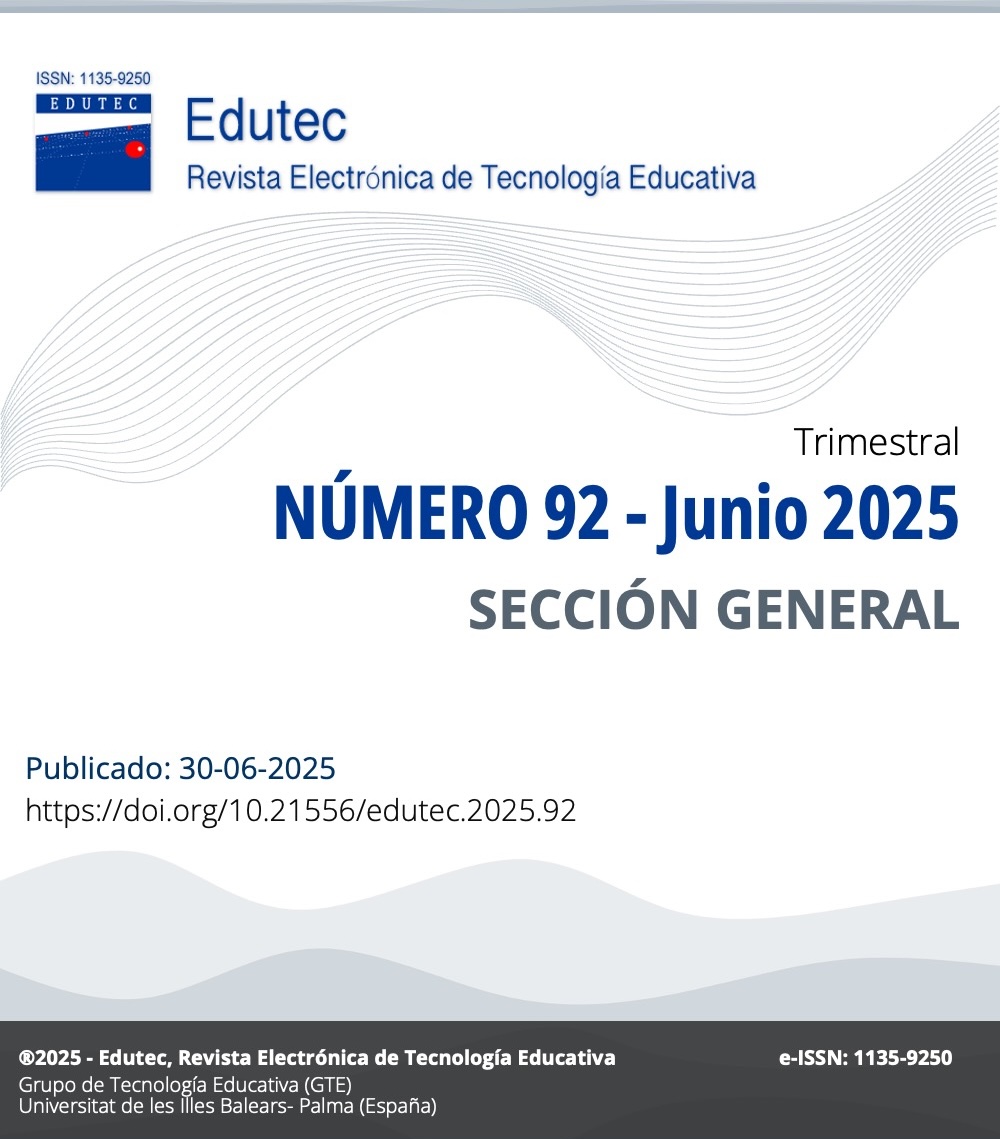Las competencias transmediáticas del alumnado universitario: un (posible) puente entre el aprendizaje informal y el formal
DOI:
https://doi.org/10.21556/edutec.2025.92.3813Palabras clave:
transmedia, educación superior, competencias digitales, TIC, educación mediáticaResumen
La participación en la cultura de la convergencia mediática permite el paso del consumo de medios a la producción de contenidos por parte de los usuarios; y eso se traduce en aprendizajes cuyas características intenta recrear, desde el punto de vista didáctico, el aprendizaje transmediático. En ese contexto, este artículo busca analizar la relación entre el perfil transmediático de los estudiantes universitarios y sus prácticas de aprendizaje informales, por medio de un estudio exploratorio de corte cuantitativo. Este análisis preliminar permite confirmar que los perfiles más avanzados en cuanto a producción de contenidos (prosumidores críticos) son especialmente proclives en su aprendizaje informal a movilizar estrategias colaborativas y a gestionar hábilmente las necesidades de información. Con todo, en general el salto a la producción y a la publicación no son generales entre el estudiantado universitario, ni en contextos formales ni en contextos informales.
Descargas
Citas
Chen, D.-T., Wu, J., & Wang, Y.-M. (2011). Unpacking new media literacy. Journal of Systemics, Cybernetics and Informatics, 9(2), 84-88. http://www.iiisci.org/journal/sci/FullText.asp?var=&id=OL508KR
Del Moral-Pérez, M.E., López-Bouzas, N. & Castañeda-Fernández, J. (2024). Transmedia skill derived from the process of converting films into educational games with augmented reality and artificial intelligence. J. New Approaches Educ. Res. 13, 15. https://doi.org/10.1007/s44322-024-00015-8 DOI: https://doi.org/10.1007/s44322-024-00015-8
Estebanell, M., González-Martínez, J., Esteban-Guitart, M. y Serrat-Sellabona, E. (2021). Media profiles and transmedia learning in university students. International Journal of Learning Technology, 16:4, 324-339. https://doi.org/10.1504/IJLT.2021.121369 DOI: https://doi.org/10.1504/IJLT.2021.121369
González Martínez J. (2022). Transmedia learning: an opportunity for digital inclusive education. Italian Journal of Special Education for Inclusion, X, 2, 229245. https://doi.org/10.7346/sipes-02-2022-22
González-Martínez, J., Esteban-Guitart, M., Rostan-Sanchez, C., Serrat-Sellabona, E., & Estebanell-Minguell, M. (2019). What’s up with transmedia and education? A literature review. Digital Education Review, 36, 207–222. https://doi.org/10.1344/der.2019.36.207-222 DOI: https://doi.org/10.1344/der.2019.36.207-222
González-Martínez, J., Runchina, C., & Sánchez-Caballé, A. (2023). Transmedia learning and gender in the context of Italian Licei Classici. Gender, Technology and Development, 27(2), 266–286. https://doi.org/10.1080/09718524.2023.2204629 DOI: https://doi.org/10.1080/09718524.2023.2204629
González-Martínez, J., Serrat-Sellabona, E., Estebanell-Minguell, M., Rostan-Sánchez, C., Esteban-Guitart, M. (2018). About the concept of transmedia literacy in the educational field. A review of the literature. Comunicación y Sociedad, 33, 15-40. https://doi.org/10.32870/cys.v0i33.7029 DOI: https://doi.org/10.32870/cys.v0i33.7029
Jenkins, H., Ito, M., & boyd, d. (2015). Participatory culture in a networked era: A conversation on youth, learning, commerce, and politics. John Wiley & Sons.
Jenkins, H., Purushotma, R., Weigel, M., Clinton, K. & Robison, A. J. (2009). Confronting the Challenges of Participatory Culture. Media Education for the 21st Century. The MIT Press. https://doi.org/10.7551/mitpress/8435.001.0001 DOI: https://doi.org/10.7551/mitpress/8435.001.0001
Koc, M., & Barut, E. (2016). Development and validation of New Media Literacy Scale (NMLS) for university students. Computers in human behavior, 63, 834-843. http://dx.doi.org/10.1016/j.chb.2016.06.035 DOI: https://doi.org/10.1016/j.chb.2016.06.035
Lévy, P. (1999). Collective intelligence: Mankind's emerging world in cyberspace. Perseus Publishing.
Lin, T.B., Li, J.Y., Deng, F., & Lee, L. (2013). Understanding new media literacy: An explorative theoretical framework. Journal of educational technology & society, 16(4), 160-170. https://www.jstor.org/stable/jeductechsoci.16.4.160 DOI: https://doi.org/10.4324/9780203219065-18
Literat, I. (2014). Measuring new media literacies: Towards the development of a comprehensive assessment tool. Journal of Media Literacy Education, 6, 15–27 htttp://digitalcommons.uri.edu/cgi/viewcontent.cgi?article=1141&context=jmle(open in a new window). DOI: https://doi.org/10.23860/jmle-6-1-2
Meyerhofer-Parra, R., & González-Martínez, J. (2023a) ‘Transmedia contentelling’: l’ús d’experiències transmedia amb absència de ‘storytelling’ en l’àmbit educatiu [‘Transmedia contentelling’: the use of transmedia experiences in the absence of storytelling in the educational environment]. Temps d’educació, 64, 83-100. https://doi.org/10.1344/TempsEducacio2023.64.6 DOI: https://doi.org/10.1344/TempsEducacio2023.64.6
Meyerhofer-Parra, R., & González-Martínez, J. (2023b). Transmedia storytelling usage of neural networks from a Universal Design for Learning perspective: A systematic review. Frontiers in Psychology, 14, https://doi.org/10.3389/fpsyg.2023.1119551 DOI: https://doi.org/10.3389/fpsyg.2023.1119551
Rodrigues, P., & Bidarra, J. (2014). Transmedia storytelling and the creation of a converging space of educational practices. International Journal of Emerging Technologies in Learning, 9 (6), 42–48. https://doi.org/10.3991/ijet.v9i6.4134 DOI: https://doi.org/10.3991/ijet.v9i6.4134
Rodrigues, P., & Bidarra, J. (2015). Design of a transmedia project targeted to language learning [Paper presentation]. ARTECH 2015. 7th International Conference on Digital Arts, ARTECH.
Rodrigues, P., & Bidarra, J. (2019). Expanding the mosaic of transmedia learning experiences: Application of a transmedia storyworld in ESL formal learning environments [Paper presentation]. ARTECH 2019: Proceedings of the 9th International Conference on digital and interactive arts, ARTECH. https://doi.org/10.1145/3359852.3359891 DOI: https://doi.org/10.1145/3359852.3359891
Runchina, C., Sánchez-Caballé, A., & González-Martínez, J. (2022). New media literacies for transmedia learning. How students are regarding their transliteracy in Italian licei classici How students are regarding their transliteracy in Italian licei classici. Cogent Education, 9(1), 0–16. https://doi.org/10.1080/2331186X.2022.2038344 DOI: https://doi.org/10.1080/2331186X.2022.2038344
Sánchez-Caballé, A., & González-Martínez, J. (2023). Transmedia learning: fact or fiction? A systematic review. Culture and Education, 35(1), 1-32. https://doi.org/10.1080/11356405.2022.2121131 DOI: https://doi.org/10.1080/11356405.2022.2121131
Sánchez-Mesa, D., Aarseth, E. J., Pratten, R., & Scolari, C. A. (2016). Transmedia (Storytelling?): A polyphonic critical review. Artnodes: E-Journal on Art, Science and Technology, 2016(18). DOI: https://doi.org/10.7238/a.v0i18.3064
Scolari, C. A. coord. (2018). Adolescentes, medios de comunicación y culturas colaborativas: aprovechando las competencias transmedia de los jóvenes en el aula [Teens, media and collaborative cultures: exploiting teens' transmedia skills in the classroom]. Barcelona: Universitat Pompeu Fabra. http://hdl.handle.net/10230/34245
Scolari, C. (2020). Cultura snack. La Marca.
Tombleson, B. (2024). Transmedia learning: a literature review. Technology, Pedagogy and Education, 33(2), 255–269. https://doi.org/10.1080/1475939X.2024.2310681 DOI: https://doi.org/10.1080/1475939X.2024.2310681
Publicado
Cómo citar
Número
Sección
Licencia
Derechos de autor 2025 Edutec, Revista Electrónica de Tecnología Educativa

Esta obra está bajo una licencia internacional Creative Commons Atribución 4.0.
Con la entrega del trabajo, los autores ceden los derechos de publicación a la revista Edutec. Por su parte, Edutec autoriza su distribución siempre que no se altere su contenido y se indique su origen. Al final de cada artículo publicado en Edutec se indica cómo se debe citar.
La dirección y el consejo de redacción de Edutec Revista Electrónica de Tecnología Educativa, no aceptan ninguna responsabilidad sobre las afirmaciones e ideas expresadas por los autores en sus trabajos.









